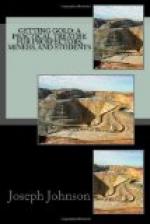At a mine of which I was managing director the lode was almost entirely composed of sulphide of iron, carbonate of lime or calcspar, with a little silica. In this case it has been found best to crush without mercury, then run the pulp into pans, where it is concentrated. The concentrates are calcined in a common reverberatory furnace, and afterwards amalgamated with mercury in a special pan, the results as to the proportion of gold extracted being very satisfactory; but it does not therefore follow that this process would be the most suitable in another mine where the lode stuff, though in some respects similar, yet had points of difference.
I was lately consulted with respect to the treatment of a pyritic ore in a very promising mine, but could not recommend the above treatment, because though the pyrites in the gangue was similar, the bulk of the lode consisted of silica, consequently there would be a great waste of power in triturating the whole of the stuff to what, with regard to much of it, would be an unnecessary degree of fineness. I am of opinion that in cases such as this, where it is not intended to adopt the chlorination or cyanogen process, it will be found most economical to crush to a coarse gauge, concentrate, calcine the concentrates, and finally amalgamate in some suitable amalgamator.
Probably for this mode of treatment Krom rolls would be found more effective reducing agents than stampers, as with them the bulk of the ore can be broken to any required gauge and there would consequently be less loss in “slimes.”
The great art in effective battery work is to crush your stuff to the required fineness only, and then to provide that each particle is brought into contact with the mercury either in box, trough, plate, or pan. To do this the flow of water must be carefully regulated; neither so much must be used as to carry the stuff off too quickly nor so little as to cause the troughs and plates to choke. In cold weather the water may be warmed by passing the feed-pipe through a tank into which the steam from the engine exhausts, and this will be found to keep the mercury bright and lively. But be careful no engine oil or grease mingles with the water, as grease on the copper tables will absolutely prevent amalgamation.
The first point, then, is to crush the gangue effectively, the degree of fineness being regulated by the fineness of the gold itself. This being done, then comes the question of saving the gold. If the quartz be clean, and the gold unmixed with base metal, the difficulty is small. All that is required is to ensure that each particle of the Royal metal shall be brought into contact with the mercury. The main object is to arrest the gold at the earliest possible stage; therefore, if you are treating clean stone containing free gold, either coarse or fine, I advise the use of mercury in the boxes, for the reason that a considerable proportion of the gold will be




